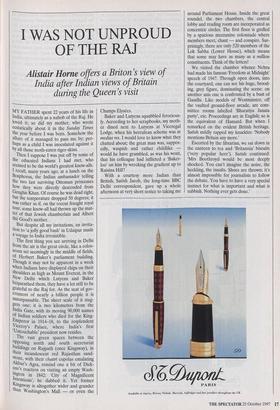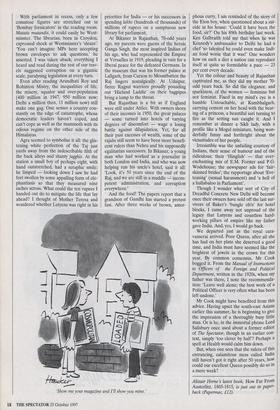I WAS NOT UNPROUD OF THE RAJ
Alistair Horne offers a Briton's view of
India after Indian views of Britain during the Queen's visit
MY FATHER spent 22 years of his life in India, ultimately as a nabob of the Raj. He loved it; so did my mother, who wrote ecstatically about it in the Sunday Times the year before I was born. Somehow the allure of it managed to pass me by; per- haps as a child I was inoculated against it by all those moth-eaten tiger-skins. Then I suppose I was put off by some of the educated Indians I had met, who seemed to be the world's greatest know-alls. I recall, many years ago, at a lunch on the Bosphorus, the Indian ambassador telling the two last surviving Ottoman princesses how they were directly descended from Genghis Khan. Of course he was dead right, but the temperature dropped 50 degrees; it was rather as if, on the recent fraught royal tour, some know-all had thrown up the mat- ter of that Jewish chamberlain and Albert the Good's mother.
But despite all my invitations, an invita- tion to 'a jolly good bash' in Udaipur made a voyage to India irresistible.
The first thing you see arriving in Delhi from the air is the great circle, like a colos- seum set seemingly in the middle of fields, of Herbert Baker's parliament building. Though it may not be apparent in a week when Indians have displayed chips on their shoulders as high as Mount Everest, in the New Delhi which Lutyens and Baker bequeathed them, they have a lot still to be grateful to the Raj for. As the seat of gov- ernment of nearly a billion people it is unsurpassable. The sheer scale of it stag- gers one: it is two kilometres from the India Gate, with its moving 90,000 names of Indian soldiers who died for the King- Emperor in 1914-18, to the resplendent Viceroy's Palace, where India's first Untouchable' president now resides. The vast green spaces between the oPPosing north and south secretariat buildings on Rajpath (once Kingsway), in their incandescent red Rajasthan sand- stone, with their chatth cupolas emulating Akbar's Agra, remind one a bit of Dick- e. ns's reaction on visiting an empty Wash- ington in 1842: 'City of Magnificent Intentions', he dubbed it. Yet former Kingsway is altogether wider and grander than Washington's Mall — or even the Champs Elysees.
Baker and Lutyens squabbled ferocious- ly. According to her scrapbooks, my moth- er dined next to Lutyens at Viceregal Lodge, when his herculean scheme was in medias res. I would love to know what they chatted about; the great man was, suppos- edly, waspish and rather childlike would he have grumbled, as was his wont, that his colleague had inflicted a 'Baker- loo' on him by wrecking the gradient up to Raisina Hill?
With a courtesy more Indian than British, Satish Jacob, the long-time BBC Delhi correspondent, gave up a whole afternoon at very short notice to taking me around Parliament House. Inside the great roundel, the two chambers, the central lobby and reading room are incorporated as concentric circles. The first floor is girdled by a spacious mezzanine colonnade where members meet, chant — and conspire. Sur- prisingly, there are only 520 members of the Lok Sabha (Lower House), which means that some may have as many as a million constituents. Think of the letters!
We visited the chamber whence Nehru had made his famous 'Freedom at Midnight' speech of 1947. Through open doors, into the courtyard, one can see his huge, brood- ing, grey figure, dominating the scene; on another axis one is confronted by a bust of Gandhi. Like models of Westminster, off the vaulted ground-floor arcade, are com- mittee rooms labelled `Bharatiya Janata party', etc. Proceedings are in English; so is the equivalent of Hansard. But when I remarked on the evident British heritage, Satish mildly rapped my knuckles: 'Nobody mentions Britain any more.'
Escorted by the librarian, we sat down in the canteen to tea and 'Britannia' biscuits (`very popular here'). Satish continued: `Mrs Boothroyd would be most deeply shocked. You can't imagine the noise, the heckling, the insults. Shoes are thrown; it's almost impossible for journalists to follow the debate. You have to have a very special instinct for what is important and what is rubbish. Nothing ever gets done.' With parliament in recess, only a few comatose figures are stretched out in `Bombay fornicators' in the reading room. Mutatis mutandis, it could easily be West- minster. The librarian, born in Croydon, expressed shock at Westminster's 'sleaze'. `You can't imagine MPs here accepting brown envelopes to ask questions,' he asserted. I was taken aback; everything I heard and read during the rest of our trav- els suggested corruption on a gigantic scale, paralysing legislation at every turn.
Even after reading Arundhati Roy and Rohinton Mistry, the inequalities of life, the misery, squalor and over-population (400 million in 1947, 950 million now; Delhi a million then, 11 million now) still make one gag. One senses a country con- stantly on the edge of catastrophe, whose democratic leaders haven't coped, and can't cope as well as the mammoth with its odious regime on the other side of the Himalayas.
Agra seemed to symbolise it all: the glis- tening white perfection of the Taj just yards away from the indescribable filth of the back alleys and shanty jugghis. At the station a small boy of perhaps eight, with hand outstretched, had a seraphic smile; he limped — looking down I saw he had feet swollen by some appalling form of ele- phantiasis so that they measured nine inches across. What could the ten rupees I handed out do to mitigate the life that lay ahead? I thought of Mother Teresa and wondered whether Lutyens was right in his priorities for India — or his successors in spending lakhs (hundreds of thousands) of millions of rupees on a sumptuous new library for parliament.
At Bikaner in Rajasthan, 70-odd years ago, my parents were guests of the heroic Ganga Singh, the most inspired Indian of his age, who had represented the Empire at Versailles in 1919, pleading in vain for a liberal peace for the defeated Germans. In the museum that was his former palace at Lallgarh, from Curzon to Mountbatten the Raj lingers nostalgically. At Udaipur, fierce Rajput warriors proudly pounding out 'Hieland Laddie' on their bagpipes bring a lump to the throat.
But Rajasthan is a bit as if England were still under Attlee. With owners shorn of their incomes in 1950, the great palaces — some turned into hotels of varying degrees of discomfort — wage a losing battle against dilapidation. Yet, for all their past excesses of wealth, some of the rajahs still seem to have been more benefi- cent rulers than Nehru and his supposedly egalitarian successors. In Bikaner, a young man who had worked as a journalist in both London and India, and who was now helping run his uncle's hotel, said it all: `Look, it's 50 years since the end of the Raj, and we are still in a muddle = incom- petent administration, and corruption everywhere.'
And the food! The papers report that a grandson of Gandhi has started a protest fast. After three weeks of brown, amor- `Show me your magazine and show you mine.' phous curry, I am reminded of the story of the Eton boy, when questioned about a sui- cide in his house: 'Could it have been the food, sir?' On his 89th birthday last week, Ken Galbraith told me that when he was Kennedy's ambassador to Delhi he had a chef `so talented he could even make Indi- an food worse that it was!' One wonders how on such a diet a nation can reproduce itself at quite so formidable a pace — 23 per cent every decade.
Yet the colour and beauty of Rajasthan captivated me, as they did my mother 70- odd years back. So did the elegance, and sparkiness, of the women — feminine but not feminist. Fixed in my mind's eye is a humble Untouchable, at Kumbhalgarh, carrying cement on her head with the bear- ing of a princess, a beautiful sari turning to fire as the setting sun caught it. And I remember at dinner a Sikh lady, with a profile like a Mogul miniature, being won- derfully funny and forthright about the vicissitudes of her people.
Irresistible was the unfailing courtesy of Indians, their sense of humour and of the ridiculous; their llinglish' — that ever- enchanting mix of E.M. Forster and P.O. Wodehouse; the newspaper ads for 'fair- skinned brides'; the rapportage about 'Eve- teasing' (sexual harassment) and 'a hell of a hullabaloo in Parliament'.
Though I wonder what sort of City of Dreadful Concrete New Delhi will become once their owners have sold off the last sur- vivors of Baker's 'bungle oh!s' for hotel blocks, I came away not unproud of the legacy that Lutyens and countless hard- working pillars of empire like my father gave India. And, yes, I would go back.
We departed just as the royal cara- vanserai arrived. Poor Queen, after all she has had on her plate she deserved a good time, and India must have seemed like the brightest of jewels in the crown for this year. By common consensus, Mr Cook bogged it. From the Manual of Instructions to Officers of the Foreign and Political Department, written in the 1920s, when my father was there, I note the recommenda- tion: 'Leave well alone; the best work of a Political Officer is very often what has been left undone.'
Mr Cook might have benefited from this advice. Having upset the south-east Asians earlier this summer, he is beginning to give the impression of a thoroughly busy little man. Or is he, in the immortal phrase Lord Salisbury once used about a former editor of The Spectator, though in an earlier con- text, simply 'too clever by half? Perhaps a spell at Health would calm him down.
But, when one sees that the rulers of this entrancing, calamitous mess called India still haven't got it right after 50 years, how could our excellent Queen possibly do so in a mere week?
Alistair Home's latest book, How Far From Austerlitz, 1805-1815, is just out in paper- back (Papermac, £12).



















































































 Previous page
Previous page